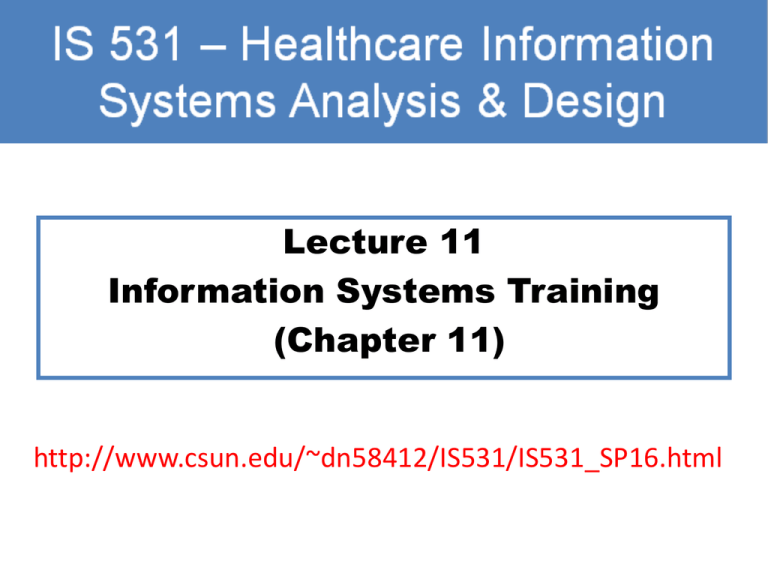Lecture 11 Information Systems Training (Chapter 11)
advertisement

Lecture 11 Information Systems Training (Chapter 11) http://www.csun.edu/~dn58412/IS531/IS531_SP16.html Learning Objectives 1. Significance of training in systems implementation 2. The training plan and its components 3. Issues in identification of training needs IS 531 : Lecture 11 2 The Significance of Training • Healthcare workers use information systems to access and document patient information • Training plays a vital role in the adoption and integration of computer technology in healthcare • IT/IS proficiency is a required skill for healthcare professionals, not a “nicething-to-have” IS 531 : Lecture 11 3 The Training Plan • Must align with the organization’s strategic initiatives • Provide blueprint for how employees will learn new computer skills • Focus on the development of knowledge and skills in an organized way • Design to ensure instructional success IS 531 : Lecture 11 4 Training Plan Components • • • • • • • Philosophy Identification of training needs Approach Resources Timetable and training schedule Budget Evaluation strategy IS 531 : Lecture 11 5 Philosophy • Instruction at a dedicated time close to the go-live date • Removed from work area • Independent to other work responsibilities • Free of work-related distractions and interruptions IS 531 : Lecture 11 6 Training Needs Identification • • • • • • • Who What content area When How How long Where With what equipment IS 531 : Lecture 11 7 Training Approach • Follows needs assessment • Determines – Content – Instructional interventions – Delivery methods – Creation or purchase of training materials – In-house trainers vs. outsourced training IS 531 : Lecture 11 8 Resources • Where will the budget for resources come from? – Salaries for trainers, support staff, replacement staff, and employees • Who will coordinate training? • Who will teach? IS 531 : Lecture 11 9 Timetable and Training Schedule • Coordinated with go-live date • Considerations: – Number of persons to be trained – Amount of time required to train each user group – Amount of time needed for all training – Budget requirements • Enough time for knowledge transfer, prectice, and application of skills IS 531 : Lecture 11 10 Evaluation • Proficiency testing – May be done electronically – Can provide immediate feedback – Reflects need for basic skills to perform job • Pre- and post-training assessments • Must consider needed remediations IS 531 : Lecture 11 11 Issues in Identification of Training Needs • • • • • • • • • End users Training class content Class schedules Equipment requirements Training costs Training center Training approaches Training materials Proficiency assessments IS 531 : Lecture 11 12 Systems Users • End users : healthcare workers who use an information system to view or document client information • Grouped by job class responsibilities • Users who perform similar functions constitute a “class” • User classes determine applications, level of access needed, training content, training time needed IS 531 : Lecture 11 13 Training Class Content Computer-related policies: user account, ID Access privileges Human factors: anxiety, uncertainty Computer literacy Workflow changes in new system/application Screen and system “freezes”: why, what to do • System idiosyncrasies disrupt user’s comfort zone • • • • • • IS 531 : Lecture 11 14 Training Class Content • Electronic help: manual, context-help, online • Error messages: missing info, data entry error • Error correction: automated, manual • Maintenance and basic troubleshooting • Downtime (planned, unplanned) procedures • Retrieval of information and other functions • Realistic situations IS 531 : Lecture 11 15 Training Schedule • • • • • • Length of training day Off-shift and weekend classes Overtime vs. part of regular work hours Training before or after work shifts Preparation time for classes Convenience of training location IS 531 : Lecture 11 16 Training Equipment • Hardware, software, and environment requirements need to mirror those in the work environment. IS 531 : Lecture 11 17 Training Approaches • Advantages , Disadvantages, and Effective Tips, • Ref. Table 11-2 (pp.223-224) IS 531 : Lecture 11 18 Training Approaches • • • • • Instructor led Technology based On-the-job training Blended approach Adjunct aids IS 531 : Lecture 11 19 Instructor-Led Training • Classroom techniques that engage the participants, such as active participation, group activities, hands-on exercises, and other various instructional approaches enhance attention and learning IS 531 : Lecture 11 20 Technology-Based Training • Uses technology to teach technology • Computer-based training • Web-based training IS 531 : Lecture 11 21 On-the-Job Training • Appropriate for short sessions • Subject to interruptions • May or may not catch all the people who need training IS 531 : Lecture 11 22 Blended Training Approach • Maximize knowledge retention • Target different learning styles • Encourage active participation IS 531 : Lecture 11 23 Training Materials • Must be well designed and reflect “real” system • Learning aids: to supplement training • Job aids: written instructions for use in training and work settings IS 531 : Lecture 11 24 Trainer Selection • Internal vs. external trainers • Teaching skills, experience, ability to interact with others, familiarity with different training approaches • Must understand various user classes and job needs • Centralized versus departmental training • Core set of internal trainers from own personnel ranks • Super users: understand department workflow, can serve as peer mentors IS 531 : Lecture 11 25 ROI from Training • Return on investment should measure by employee’s job satisfaction and retention. • Well-trained attain required skill levels in less time, ask for less assistance, spend less time to correct errors IS 531 : Lecture 11 26 Training Nonemployees • Significant numbers of office staff members and students require training and access • Must consider this population in the overall training plan • Organization may not have benefits IS 531 : Lecture 11 27




